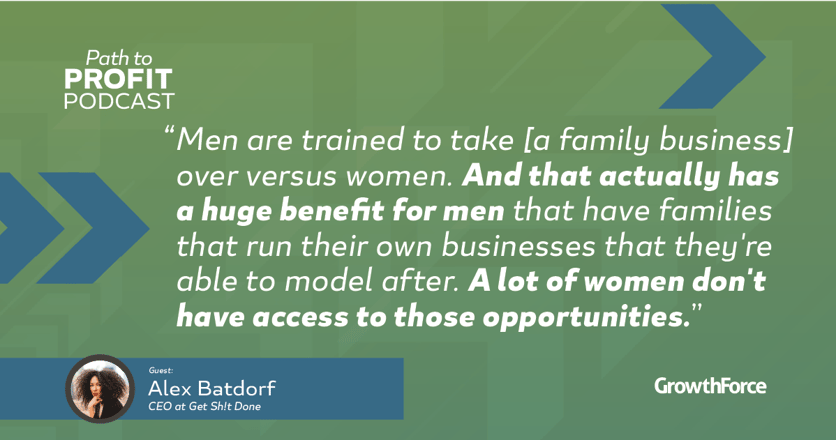9 min read

Women own 50% of businesses but generate only 4% of total revenue, and 90% of woman-owned businesses generate less than six figures in revenue per year.
|
Key Takeaways
|
These surprising statistics were shared by Path to Profit guest, Alex Batdorf. Batdorf is the Founder and CEO of Get Sh!t Done, a company that helps women in business overcome the challenges that all entrepreneurs face in addition to those faced primarily by women to achieve business growth and become successful entrepreneurs.
🎧 The Podcast For GROWTH Minded CEOs
Listen to the full episode (& many more) here!
The Three Barriers Holding Back Women Business Owners
1. Lack of Available Modeling for Women Entrepreneurs
In Batdorf's personal experience as a woman entrepreneur and through her observations of the women entrepreneurs with whom she works, she believes that one of the primary barriers that women face in business is a lack of modeling, and by modeling, she does not necessarily mean business models. Instead, she means a lack of role modeling or women leaders in business for aspiring female entrepreneurs to look up to and model their own behaviors and choices after.
According to Batdorf, though, an issue with the typical business model of women entrepreneurs does also exist. She credits the lack of revenue generated by female businesses to an overarching failure to scale the typical type of business started by women. Batdorf provided examples of women who start businesses such as salons and daycares. As she explains, these types of businesses are not obviously scalable, but they could be with the right innovations, business growth know-how, and propensity for risk.
If more women were more aggressively pursuing business growth in these sectors, then more women would see these models and follow suit in their own entrepreneurial endeavors.
Read More: Leveraging a Growth Mindset for Business Growth
2. Access to and Ability to Activate a Business Leadership Network
Batdorf also discussed her experience with aspiring female entrepreneurs and their struggles to build and activate or use a network of experienced entrepreneurs and other types of contacts. In our interview, she said that she estimates 99% of the women she meets and offers support never follow up with a second conversation. They never contact her again for advice or to receive her actual support.
Batdorf's observations of women's reluctance to follow through on their pursuit of building and using a business network might be the result of the female tendency to be highly agreeable. In the Five-Factor Model of Personality Traits (commonly referred to as "The Big 5 Personality Traits"), women tend to score higher than men on the personality traits of agreeableness and neuroticism (more on neuroticism in the next point) [1].
Breaking the glass ceiling: What can we be doing TODAY to support women entrepreneurs?
Listen to the full episode here.
Being highly agreeable means that asking for someone's help can feel extremely uncomfortable, and this discomfort is often enough to prevent an agreeable person from creating professional networks or asking the members of these networks for advice or support.
3. The Social Conditioning of Perfectionism (i.e. Waiting Until You're Ready)
According to Batdorf and her experience working with countless women who are aspiring entrepreneurs, one of the biggest barriers she sees women face when starting businesses is that they tend to be socially conditioned to strive for perfectionism. Plus, it's not just a woman's social conditioning that feeds their desire for perfectionism and fear of failure, it's also their tendency to score higher in neuroticism on The Big Five Personality Test than men. In other words, women are more likely than men to be risk averse and to worry - worry about all sorts of things.
What this means is that most women want to wait until they are 100% ready before diving in and starting their businesses. They want to ensure that they know everything there is to know, all of their ducks are in a row, and every kink is worked out of the system before they go into business. Women tend to worry so much about things going wrong that it can prevent them from starting businesses or taking risks in scaling their existing enterprises.
As most business owners already know, this kind of perfectionism isn't possible in business. In business, there are always new challenges to face, new lessons to learn, and new mistakes to be made. As a result, it's necessary for women to "unlearn" the social conditioning toward requiring perfectionism. Women entrepreneurs need to understand that perfectionism isn't possible (or necessary) in business and that no one is ever fully ready, in that sense, to start a new business.
Read More: A Guide To Setting Better Business Goals
In business, it's necessary to dive in, be prepared to make mistakes, and be nimble enough to respond to those mistakes as you learn from them along the way. Fearing and avoiding failure is the quickest way to actually fail in business - especially if it prevents you from ever actually trying to succeed.
As Thomas Edison once said, "I failed my way to success," [2]. It's necessary for all entrepreneurs - man or woman - to understand the necessity of failure as an integral ingredient in the recipe for achievement.

What Women in Business Can Do to Break Through the Glass Ceiling
According to Batdorf, women can overcome these barriers to success in business by actively seeking out the example of other women entrepreneurs. This can help women in business identify pathways to success, ways of doing business, and business models that more closely reflect the way they would prefer to operate their own businesses. They must also strive to be proactive in building their own professional networks (of both successful male and female entrepreneurs). Women must also shed their desire for perfectionism and ready themselves to dive into business head-first, unafraid of being less-than-perfect and ready to learn from their mistakes.
To learn more about Alex Batdorf's story, what you can do to support women in business, and how Get Sh!t Done helps female entrepreneurs succeed, listen to our complete conversation with Batdorf on GrowthForce's podcast, Path to Profit.
[1] https://www.ncbi.nlm.nih.gov/pmc/articles/PMC2031866/



